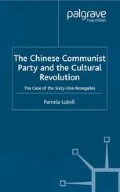Abstract
The rehabilitation of Cultural Revolution victims began as early as 1968 and continued well into the 1980s. There were peak years – 1973 and 1978 – and years in which the numbers dropped sharply, for example 1976.2 The question of who was eligible for rehabilitation was both a recurrent theme and a frequent cause of leadership conflict, but the principle of political rehabilitation was never invalidated, even by the most radical in the leadership. On the contrary the notion that a man’s political consciousness could be rectified and recharged despite his previous political record was an integral element of the Thought of Mao Zedong – as it was in traditional Chinese culture – and had been at the heart of almost every political campaign initiated during the Maoist era. Since political re-education was supposed to be more of a privilege than a punishment, the rehabilitated often referred to their period of detention or internal exile as a fruitfully ‘tempering’ experience – even if they returned to the fold after the accusations against them were proved false or unjust. This attitude served to obscure the Party’s role in an act of injustice and enhance its image as an educator.3
To call a cadre a renegade is the most effective tactic for discrediting any party cadre in the public eye. Unlike other political mistakes … being a renegade is an almost unforgivable sin.… Once applied, these labels substantially decreased anyone’s chance for a verdict reversal, even when the political atmosphere changed drastically. In fact those who had been condemned as renegades – mostly those from the White areas – were the last to be rehabilitated.1
Access this chapter
Tax calculation will be finalised at checkout
Purchases are for personal use only
Preview
Unable to display preview. Download preview PDF.
Author information
Authors and Affiliations
Copyright information
© 2002 Pamela Lubell
About this chapter
Cite this chapter
Lubell, P. (2002). Rehabilitating the Sixty-One. In: The Chinese Communist Party and the Cultural Revolution. St Antony’s Series. Palgrave Macmillan, London. https://doi.org/10.1057/9781403919649_6
Download citation
DOI: https://doi.org/10.1057/9781403919649_6
Publisher Name: Palgrave Macmillan, London
Print ISBN: 978-1-349-42403-0
Online ISBN: 978-1-4039-1964-9
eBook Packages: Palgrave History CollectionHistory (R0)

